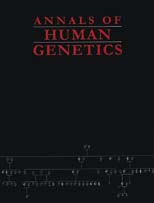Article contents
Equivalence by descent: pedigree analysis with inbreeding and gametic phase disequilibrium
Published online by Cambridge University Press: 01 January 2000
Abstract
In the presence of gametic phase disequilibrium and inbreeding, multiple locus genotype frequencies cannot be written solely in terms of identity by descent (IBD) probabilities. Following Cockerham & Weir (1973) we introduce the concept of ‘equivalence by descent’ (EBD), an extension of the concept of IBD to include non-allelic genes. Two genes are said to be EBD if they derive ultimately from the same founding gamete of a pedigree. Allelic genes that are EBD are also IBD. For two loci 11 EBD probabilities, the ‘J-coefficients,’ are required and for three loci 117 J-coefficients are required to write genotype probabilities. It is shown how the 117 J-coefficients for three loci can be reduced to a basic set of 37. Computer programs, written in the algebraic programming language, MAPLE™, are described which are capable of calculating the two- and three-locus J-coefficients for any pedigree, subject only to size limitations. The MAPLE™ packages are available from the author upon request.
- Type
- Research Article
- Information
- Copyright
- © University College London 2000
- 6
- Cited by




